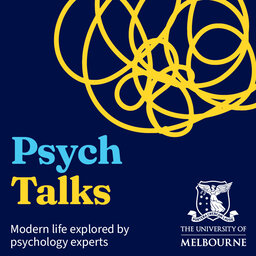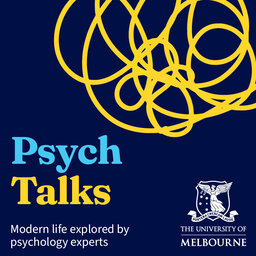


PsychTalks
Playlist by PsychTalksThis is PsychTalks: a podcast that deep dives into groundbreaking research in psychology. Hear psychology and neuroscience experts unpack how our minds work – and discover how these insights can enric…Follow the podcast:
27 clip(s) in playlist

Do we ever stop being curious?
We said the season was over – but when the chance to sit down with Professor Alison Gopnik comes along, you make an exception. In this bonus episode, we’re delighted to welcome one of the world’s most influential developmental psychologists for an extended conversation on how our minds grow and cha…
45:34
Shelf deception: How does marketing on packaged foods influence us?
Are we really making healthy choices for our children in the supermarket? Or are we being nudged by bright colours, on-pack claims and fruit-filled imagery? Associate Professor Helen Dixon and Jane Martin unpack the psychology, policy and packaging that influence what ends up in our shopping troll…
31:14
Why is misinformation so powerful?
Misinformation and disinformation now pose some of the biggest global risks to democracy and public trust. Associate Professor Piers Howe explains how misinformation and disinformation spreads, and the subtle but influential ways they can shift public opinion, disrupt elections and damage society.…
28:09
How does power and influence shape our lives?
Want tips on how to use power and influence more effectively - whether you’re pitching an idea, leading a team, or asking your preschooler to brush their teeth? Professor Jennifer Overbeck unpacks what sets power apart from influence, how persuasion works, and why gender, identity and context matte…
31:46
Can self-compassion help us better navigate menopause?
What are the mental health impacts of menopause and how are they connected with our ideas about ageing? Dr Lydia Brown shares insights from her research on self-compassion and how it can help those managing the psychological challenges of menopause. Whether you’re approaching menopause or simply in…
30:49
How does language shape the way we think?
What do the names of colours, kinship terms and legal jargon tell us about the human mind? Dr Frank Mollica explores language as a cognitive tool – shaped by culture, adapted for purpose, and far from universal. We dive into how children learn language, how it evolves and why legal language is so …
27:01
Are some people just nicer?
Why do some people seem naturally kind or generous? Professor Luke Smillie breaks down personality traits like empathy, honesty and compassion – and how they shape behaviour. Tune into this thoughtful discussion about the ‘prosocial personality’ and discover whether people can become more altruisti…
24:09
Can social media bans protect young minds?
Will the Australian government really lock under-16s out of TikTok? Associate Professor Scott Griffiths returns to PsychTalks to unpack Australia’s proposed social media ban. He breaks down the psychological harms driving the policy, the challenges and possible pathways to secure enforcement, and w…
23:53
How does Ozempic affect the brain in binge eating disorder?
Could Ozempic do more than help with weight loss? Dr Trevor Steward is uncovering the science behind what’s happening in the brain when people take drugs like Ozempic. His research queries how these medications influence appetite, food-related thoughts, and their potential to turn down the dial on …
28:06
Why do we keep secrets?
Unlock the psychological reasons behind why we hold onto secrets. Associate Professor Katie Greenaway and Valentina Bianchi explore the emotional costs and benefits of keeping secrets. Discover who we often confide in and hear a clinical psychologist’s perspective on being a professional secret-kee…
25:42
 PsychTalks
PsychTalks